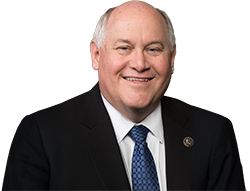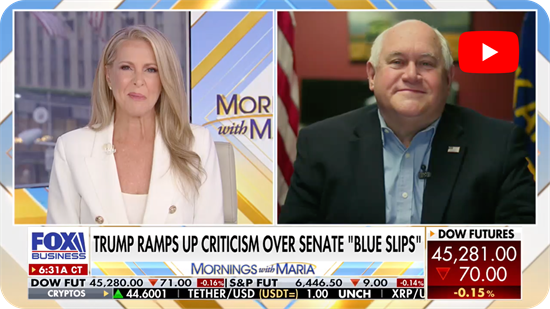ICYMI: Estes Joins Mornings with Maria
Washington,
August 27, 2025
|
Hannah Rawles
((202) 225-6216)
U.S. Congressman Ron Estes (R-Kansas) joined Mornings with Maria to discuss President Trump’s executive orders to combat crime in Washington D.C., the upcoming stopgap funding bill, digital services taxes, and more. Read a transcript below. Watch the interview on YouTube and Rumble.
On the upcoming stopgap funding bill: “I think there's a good likelihood of it being a CR again. I think part of it's just been the problem over the last almost 30 years where we haven't passed appropriations on time. I think it's a bad habit that we've gotten into. “In terms of working through that process, I'm not in favor of a CR. It's problematic. You can't plan for the year. You end up missing some very important provisions that you want to include, and being able to to help the military as they go out and buy spare parts. You need to be able to have appropriations to plan for that. “It's an important part in the process. One of the things that, you know, a part of this bad habit that we've gotten into is, instead of using the authorizing committees to actually go out and make the limits and the criteria and approving different programs, we've relied on appropriations to do all of that. So it ends up being the last dog fight in terms of discussion about what's the right policy? What's the right dollar amount to spend? “We're hearing some comments back and forth from some of the Democrats that, you know, if the president's going to look at rescissions to cut out wasteful spending, they're not going to agree to an appropriations process. “I think it's going to be a difficult September as we work through that process, trying to figure out how do we keep the government open to provide those services that we want to provide for the American people?” On President Trump’s executive orders to end cashless bail and make Washington D.C. safe: “It's really harmful, this cashless bail process, where you end up having somebody who willingly goes out and breaks the law and then they're not held accountable for what they do. And then basically turned back out into the streets to cause more criminal acts through that process. So I'm happy that the president has issued this focus on cashless bail, particularly for the District of Columbia. “The District of Columbia is special. It's not a state. It's a federal entity, that's set up [as a] special territory. So, the federal government has responsibility. There are some home rule provisions that allows the District of Columbia to do some things, but at the end of the day, the federal government still has ultimate responsibility. And we've seen crime increase … We want to make sure that our nation's capital is a safe place, a clean place, and it's an enjoyable place for Americans to go visit or for people from another country to come visit. We want to be proud of our capital city … We want to make sure that it's safe and cashless bail has not allowed that to happen.” On whether he supports the National Guard being sent to other American cities: “It's a little bit different dynamic within those cities, that are in a state like Illinois. Obviously, there's an issue there, that crime is running rampant in so many of these cities. We need to make sure that there's good policies to protect Americans. At the end of the day, that should be the driving force: how do we make sure that Americans are protected?” On President Trump getting his cabinet appointments confirmed: “It's part of the process where the Senate's not doing its job to advise and consent. To actually make sure that the president gets the staff around [him] to fill the obligations that we have passed laws on. The House and the Senate have voted on different provisions that we expect the executive branch to fulfill … It's important that the Senate doesn't slow down that process just because the president happens to be of a different political party. I mean, we've seen it … throughout the years, there's a lot of Democrat appointments when there's a Democrat president that I didn't agree with their policy, but the president needed to have their team to actually implement the policy they wanted to do. So, I think it's very important that … we get those appointments confirmed and through the process.” On Digital Services Taxes (DSTs): “There's a lot of things to do. You talked earlier in your other segment about the digital services taxes … that's something we're working on as well from a Ways and Means standpoint. Obviously, we don't want other countries going out and unfairly treating America, unfairly treating American companies. We want to make sure that there's a good process. The OECD, the Organization for Economic Cooperation and Development, was working on a process to address that so that we had a standard approach, but that got waylaid with some other bad taxes that they were trying to target American companies. So we've been pushing back on that as well.” |








